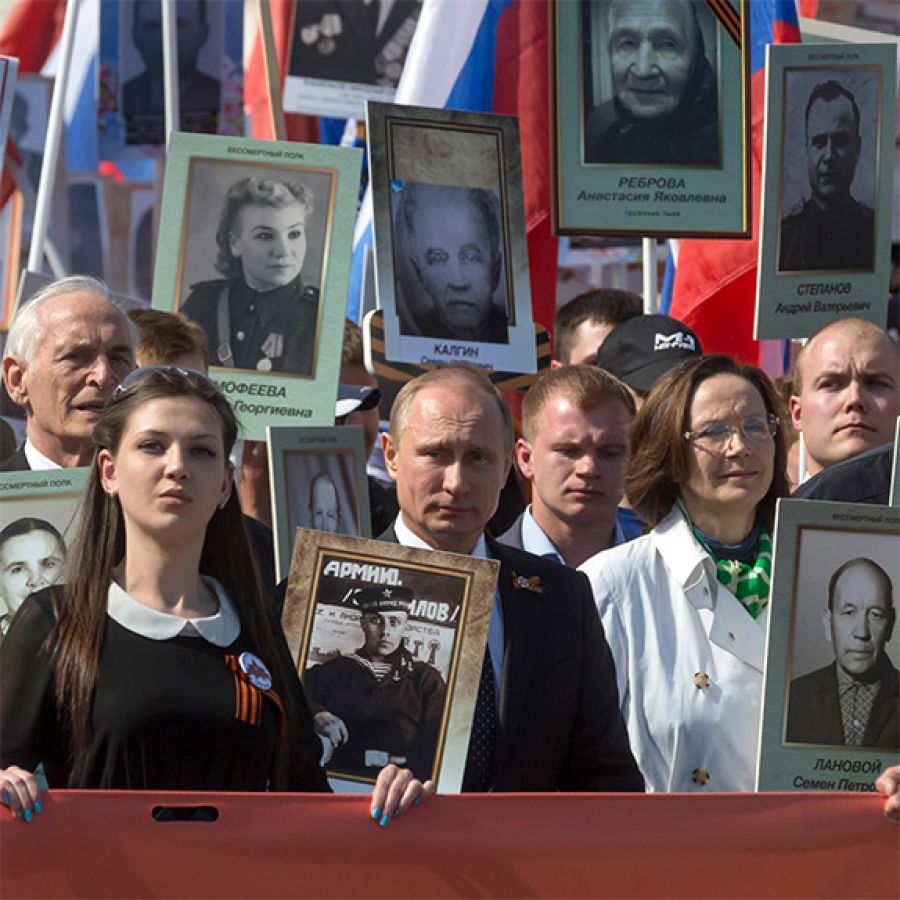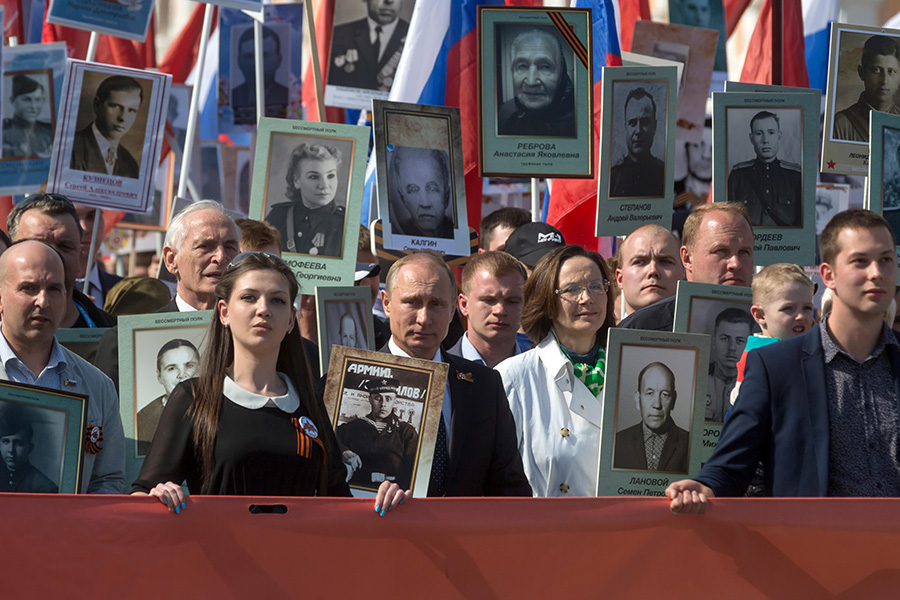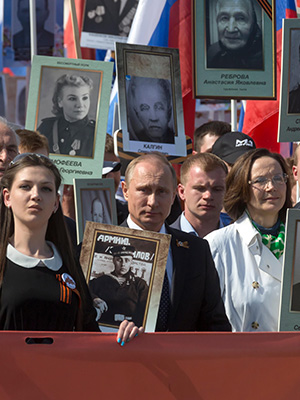
- Free Article: No
- Contents Category: Commentary
- Custom Article Title: ‘Marking May 8 eighty years on: Relinquishing our memories of World War II’
- Review Article: No
- Article Title: Marking May 8 eighty years on
- Article Subtitle: Relinquishing our memories of World War II
- Online Only: No
- Custom Highlight Text:
Remember when the Russians ‘liberated’ Berlin in 1945, ending World War II? The iconic image of a Soviet soldier raising the Soviet flag over the Reichstag became a staple of popular culture as well as historical memory. It was the culminating point of the wartime Alliance of the ‘Big Three’, with Winston Churchill, Franklin Roosevelt, and ‘Uncle Joe’ Stalin hanging out together like old friends and deciding the fate of the world.
Of course, it is nothing new to have the Russians (or Soviets) and their erstwhile wartime Allies, the United States and Great Britain, interpreting history differently. That was one of the constants of Cold War propaganda in the almost half-century after the break up of the wartime alliance. From the mid-1960s, Victory Day was celebrated in Moscow on May 9 with a public holiday and ever more impressive military parades. The Eastern European satellites states (at least those that could portray themselves as having been on the Allied side) followed the same pattern of celebration. In 2005, the sixtieth anniversary of the end of World War II, German Chancellor Angela Merkel and US President George W. Bush both attended the celebration of Victory Day in Moscow in acknowledgement of the Allies’ debt to the Soviet Union in defeating the Nazis. Vladimir Putin’s Russia has taken up the old Soviet festival with enthusiasm, making ‘victory over fascism in the Great Patriotic War’ the core of the national foundational myth.
For the Western Allies, the name of the day was Victory in Europe (VE Day), and it was celebrated on May 8, because of the time difference (German capitulation in Berlin occurred so late on May 8 that it was already May 9 in Moscow). West Germans, like East Germans in the Soviet bloc, did not celebrate anything much until, in 1985, President Richard von Weizsäcker called for recognition that May 8 ‘was a day of liberation ... from the inhumanity and tyranny of the National Socialist regime’. But that didn’t make it an official holiday.
The first ever German public holiday on May 8 was held this year on the eightieth anniversary of the German capitulation in World War II. Echoing Weizsäcker, it was called (though not officially) ‘Liberation Day’. The public holiday was a one-off event, not a permanent addition to the official calendar, and Berlin was the only region in the country to make it a real holiday, with shops and enterprises shut. All the same, it was projected nationally by a televised meeting of the Bundestag, Germany’s parliament, marking the day.
Giving the keynote speech, President Frank-Walter Steinmeier stressed the theme of liberation from the Nazi regime and thanked the Allies for their help. But ‘the Allies’ turned out to mean the Americans, British, and French. True, he did in one moment conjure the Soviets – ‘we all know what the Red Army contributed, Russians, Ukrainians, Belarusians, and all those who fought in it’ – but there was no mention of a Red Army liberation of Berlin. The only place the Red Army was credited with liberating was Auschwitz.
Steinmeier’s omission of the Soviet Union was, of course, not accidental, but an intended slap in the face to the Russians (whose diplomatic representatives had not been invited to the Bundestag event) because of the war in Ukraine. ‘The liberators of Auschwitz have become the new aggressors,’ the President said. Honouring the memory of May 8 means ‘support for Ukraine in its fight for its freedom’.
Bundestag President Julia Klöckner reinforced the anti-Russian message in her own way, devoting her speech largely to the plight of civilian women in war and the prevalence of rape. There was no need to spell out who the rapists were; according to German popular memory, that unambiguously means Soviet troops, fired up with anger against the Germans and allowed to run rampant in Berlin and elsewhere.
Steinmeier had other points to make. He spoke strongly about German (not just Nazi) guilt in the war, noting that ‘by no means all Germans felt gratitude for liberation’ and unfortunately similar views were held by ‘some in this House’. That was directed at the right-wing party Alternative for Germany (AfD), fresh from a strong showing in the Bundestag elections after years of boycott by Germany’s ‘respectable’ political parties. AfD thinks German guilt has gone on long enough; it likes Putin’s Russia and Putin’s Russia likes it, as does President Trump’s United States. The AfD members of the Bundestag visibly refrained from applause at key points in Steinmeier’s speech.
We are seeing ‘a double epochal shift in European history’ in the era of Putin and Trump, Steinmeier said, which was the result of Russia’s invasion of Ukraine and the United States’s ‘break with its values’ under the second Trump administration. Europe was on its own for the first time since World War II; the message that a May 8 celebration should convey was of a ‘new united Europe’ emerging from World War II. ‘Now we [Europeans] must assert ourselves! … We must show that democracies are not defenceless victims.’
This segue enabled Germany to move into another celebratory space, namely celebration of Europe and its postwar union. Europe Day was originally marked on May 5, the date of the foundation of the Council of Europe in 1949. But in 1985 the date was shifted to May 9, ostensibly to commemorate the Schuman Declaration of 1950 proposing the creation of a French, Italian, and West German coal and steel community – a step towards European economic integration, though not one that everyone would think important enough to warrant annual celebration. The declared purpose of the May 9 event was to ‘facilitate European integration by fostering a Pan-European identity’, but the choice of Soviet Victory Day as the date can scarcely have been an accident.
The idea of Europe, however, has something of a charisma deficit and for some years Europe Day did not really catch on. Spain, more or less a bystander in World War II, celebrated it in a minor way, as did Italy. In France in the 1970s, there was a failed attempt to introduce a European Unity Day in place of Victory Day.
Victory Day, Soviet style, suffered a setback after 1989, when the Eastern European states extricated themselves from the Soviet bloc and its rituals. The subsequent exit of non-Russian republics from the Soviet Union was a second blow. One post-Soviet tendency was to complicate the notion of liberation by making it liberation from both German and Soviet occupiers. The Baltics took this route, as did Poland. Romania and Bulgaria kept a foot firmly in both camps by celebrating Victory Day (but on May 8, not May 9) and Europe Day (on May 9). So did Ukraine, although its departure from Soviet-style celebrations came late, only in 2013 with Euromaidan, a series of protests in Ukraine that toppled President Viktor Yanukovych, Russia’s client. Since 2023, Ukraine has celebrated what the country terms a ‘Day of Remembrance and Victory over Nazism in World War II, 1939-1945’ on May 8, asserting difference from Russian usage by calling it World War II, not the Great Patriotic War, and marking the war’s opening year as 1939, not 1941. In 2023, Ukraine also began celebrating Europe Day on May 9, which President Volodymyr Zelensky flagged as an expression of gratitude for European help for Ukraine in the current war.
 Vladimir Putin with the portrait of his father, Vladimir Spiridonivich, Victory Day, 2015 (Nikolay Vinokurov/Alamy)
Vladimir Putin with the portrait of his father, Vladimir Spiridonivich, Victory Day, 2015 (Nikolay Vinokurov/Alamy)
But all is not lost for a Soviet-style May 9 Victory Day. Belarus, Russia’s ally, may be alone in keeping up the full celebration of Victory Day, including a military parade in Minsk, but there are still celebrations in the now independent former Soviet republics of the Caucasus and Central Asia, though sometimes under a different name (including Victory and Peace Day or Day of Remembrance and Honour).
In Serbia (formerly part of Yugoslavia, in and out of the postwar Soviet bloc, now a candidate member of the European Union) and Slovakia (formerly part of Soviet-bloc Czechoslovakia, now in the European Union), Victory Day is still celebrated, although Slovakia has moved it to May 8. These two countries both have populist governments that are unenthusiastic about European support for Ukraine in the current war. Not coincidentally, Serbia’s Aleksandar Vučić and Slovakia’s Robert Fico were the only EU member leaders to ignore warnings from Brussels and attend this year’s Victory Day celebrations in Moscow.
A notable absentee from those celebrations was Hungary’s Viktor Orbán, an EU troublemaker who is generally a friend of Putin’s Russia. Even in Soviet times, Hungary did not celebrate Victory Day, as it was in the awkward category of former Axis belligerent. As Orbán’s spokesman stated, ‘It would still not make sense for Hungary to take part in the celebrations, as the end of World War II marked a bitter defeat for the country.’ That actually didn’t explain much, but it is possible to glean insight into Orbán’s thinking from his speech at a Peace March in Budapest last year. Christians know that war is always evil, he said (Orbán is a Reform Calvinist, though as leader of a predominantly Catholic country attends mass regularly). Historically, war has been particularly bad for Hungary, which was manoeuvred in World War I and II into sending troops to fight against Russia on the Eastern front, and is now under pressure from Brussels to pick a fight with Russia again in protest against Russia’s invasion of Ukraine. But Hungary won’t play, Orbán made clear. It is the only country in Europe with a genuine commitment to peace, he said, apart from the Vatican – which, unlike Hungary, has no troops. Hungary is not going to let anyone push it into war. Take that, European Union and Russia both.
May 8 and 9 may have passed quietly in Hungary as far as geo-political symbolism is concerned, yet they did not go unrecognised. May 8 has been declared ‘Hungarian Ice Cream Day’ by Budapest authorities, and this year the celebration was made ‘even more special … with the arrival of the Hallelujah ice cream, the official dessert of the Vatican’s Jubilee Holy Year’. How’s that for changing the narrative? But there is breaking news on the celebration front that is more serious.
The Bundestag has just declared another one-off holiday that is a striking departure from past precedent: Veterans’ Day, to be held for the first time this year on June 20. As Klöckner was at pains to emphasise in her announcement, the current German army, the Bundeswehr, is an instrument of parliamentary democracy and the celebration is not only of military veterans but also of serving soldiers. Is this the other shoe dropping, with Liberation Day the first? Or did May 8’s celebration of the defeat of an earlier German army (the Reichswehr) in 1945 need a counterbalance? The plot thickens, but we may have to wait until next year to find out where it goes next.



Comments powered by CComment